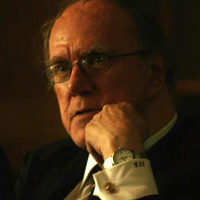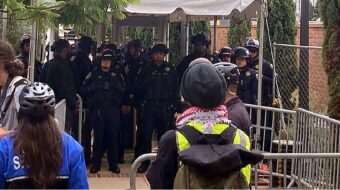I don’t know exactly what the relation is between federal judges and dybbuks, evil spirits in Jewish mythology, but it seems that, for second time since I can remember, a federal justice has been possessed by a dybbuk.
The first time was when judge Julius Hoffman was possessed during the 1969 trial of the Chicago Seven. Hoffman’s behavior on the bench was so outrageous (he was later rebuked by a Federal Appeals Court), that the defense suggested that he had been possessed. Fortunately for him, the Radical Jewish Union in New York performed an exorcism, in absentia, during the early 1970s to free him of the spirit.
Now it seems that Supreme Court Justice Antonin Scalia has also been possessed by a dybbuk, even though they are not known to possess non-Jews. No other explanation seems possible for the way he demeaned his office by his comments pertaining to the recent Supreme Court ruling requiring California to eliminate the severe overcrowding in its prisons.
The court found that California was violating the Eighth Amendment (against cruel and unusual punishments) and must reduce its prison overcrowding by 30,000 souls or so over the next two years.
Here is some of evidence presented to the justices: Prisoners held in cages the size of a telephone booth with no toilet; an inmate suicide rate 80 times the national average; a prisoner dies every six or seven days as a result of unconstitutional behavior (that is, 52 unofficial “capital punishments” every year at least). The court, in ordering a reduction of 30,000 prisoners, will still leave the prison population at 137.5 percent of capacity, so some horrific conditions will still continue. The NY Times quotes David C. Fathi of the ACLU as saying, “This case involves ongoing, undisputed and lethal constitutional violations.”
These horrible facts, being “undisputed,” might lead you to think the court would have been outraged by this violation of the Constitution – but it wasn’t; it was only a 5 – 4 decision with the usual suspects caring little for the constitutional issues (i.e., Scalia, Alito, Thomas and Roberts).
Justice Kennedy, writing for the majority, said, “A prison which deprives prisoners of basic sustenance, including adequate medical care, is incompatible with the concept of human dignity and has no place in civilized society.” The votes against the majority indicates that some justices think it is compatible, but their views on what it means to be civilized are wanting in the extreme.
Scalia’s comments were particularly disgusting and demeaned his office. Faced with the evidence of high suicide rates and the unjust suffering and deaths of prisoners, he tried to justify his inhumane vote by insinuating that the court would be responsible for releasing thousands of “happy go lucky felons,” many of whom “will undoubtedly be fine physical specimens who have developed intimidating muscles pumping iron in the prison gym.”
This type of polemic is far beneath the dignity of the Supreme Court and can only be explained by the presence of a dybbuk or similar creature in control of the justice’s mouth (he gave a rare oral objection). The other three dissenters also worried about violence that may be let loose on society and shed crocodile tears for future victims. But they know perfectly well that the state had already declared that no violent prisoners or those convicted of violent crimes would be released.
This split vote reveals that at least four of the justices on the Supreme Court are lacking in basic feelings of humanity and have no concerns about outrageous violations of those parts of the Bill of Rights designed to protect people from governmental abuse. In the name of the Bill of Rights, it is imperative that no Republican president should come to power and be able to appoint such troglodytes to the court. As for Justice Scalia – I hope he gets treatment for his dybbuk as soon as possible, certainly before he offers any more decisions to the court.












Comments